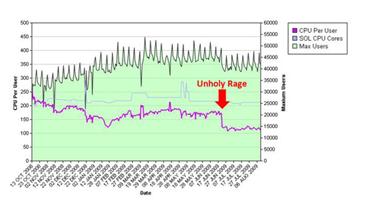Games Company Declares War on Gold Farmers
On June 22, administrators at Iceland-based CCP Games cut off 6,200 users–about 2 percent of its total user base–in the science-fiction-themed multiplayer game EVE Online.
The operation, dubbed Unholy Rage by CCP, targeted accounts used to build up experience or obtain goods that could then be sold for real money, a practice known as gold farming. These real-money traders (RMTs) plague many massively multiplayer online role-playing games, including the immensely popular sword-and-sorcery title World of Warcraft.
Immediately after Unholy Rage, the load on CCP’s servers dropped by 30 percent, as automated accounts suddenly were no longer demanding resources.
“This clearly shows the very disproportionate load the RMT type accounts imposed on our system,” the company said in a blog post describing the operation. “That is a whole lot of CPU for the rest of you to play with, people.”

Cutting off 6,200 accounts – about 2 percent of the EVE Online user base – returned 30 percent of its server capacity back to CCP Games. (Source: CCP Games)
Currency traders typically pay players in developing countries or use automated game-playing bots to create a steady supply of virtual money. Game companies actively pursue such traders, as well as the software developers that enable the automated playing of online games. Blizzard Entertainment, for example, which runs World of Warcraft, has created a program to prevent bots from playing and has taken legal action against the developers of such add-ons.
Gold farmers don’t just spoil the game. The FBI and the U.S. Secret Service, both of which pursue online criminals, have started looking at game-currency traders as a potential front for money launderers.
CCP Games, which has its own on-staff economist–a Ben Bernanke of the EVE Online universe–promises that Unholy Rage is just the beginning.
“The war against the RMT element continues,” the company stated. “Our objective is to get rid of them, plain and simple. They are a heinous nuisance and a serious drawback on our systems and resources.”
Keep Reading
Most Popular
Large language models can do jaw-dropping things. But nobody knows exactly why.
And that's a problem. Figuring it out is one of the biggest scientific puzzles of our time and a crucial step towards controlling more powerful future models.
How scientists traced a mysterious covid case back to six toilets
When wastewater surveillance turns into a hunt for a single infected individual, the ethics get tricky.
The problem with plug-in hybrids? Their drivers.
Plug-in hybrids are often sold as a transition to EVs, but new data from Europe shows we’re still underestimating the emissions they produce.
Stay connected
Get the latest updates from
MIT Technology Review
Discover special offers, top stories, upcoming events, and more.